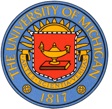Alice Hamilton was the first woman appointed to the faculty of Harvard University and was a leading expert in the field of occupational health. She was a pioneer in the field of toxicology, studying occupational illnesses and the dangerous effects of industrial metals and chemical compounds on the human body.
In 1893, she received her medical degree from the University of Michigan Medical School, and then completed internships at the Minneapolis Hospital for Women and Children and the New England Hospital for Women and Children.
Hamilton traveled to Europe to study bacteriology and pathology at universities in Munich and Leipzig from 1895 to 1897. When she returned to the United States, she continued her postgraduate studies at the Johns Hopkins University Medical School. In 1897, she moved to Chicago, where she became a professor of pathology at the Woman's Medical School of Northwestern University.
Soon after moving to Chicago, Hamilton became a member and resident of Hull House, the settlement house founded by social reformer Jane Addams. Living side by side with the poor residents of the community, she became increasingly interested in the problems workers faced, especially occupational injuries and illnesses. The study of 'industrial medicine' (the illnesses caused by certain jobs) had become increasingly important since the Industrial Revolution of the late nineteenth century had led to new dangers in the workplace. In 1907, Hamilton began exploring existing literature from abroad, noticing that industrial medicine was not being studied much in America. She set out to change this, and in 1908 published her first article on the topic.
In 1908, Hamilton was appointed by the governor of Illinois to the newly formed Occupational Diseases Commission of Illinois, the first such investigative body in the United States.[2] For the next decade she investigated a range of issues for a variety of state and federal health committees. She focused her explorations on occupational toxic disorders. Relying primarily on "shoe leather epidemiology," and the emerging laboratory science of toxicology, she pioneered occupational epidemiology and industrial hygiene in the United States. Her findings were scientifically persuasive and influenced reforms, both voluntary and regulatory, to improve the health of workers.
In 1919, Hamilton was hired as assistant professor in a new Department of Industrial Medicine at Harvard Medical School, making her the first woman appointed to the faculty there. A New York Tribune article celebrated the appointment with the dramatic headline: "A Woman on Harvard Faculty—The Last Citadel Has Fallen—The Sex Has Come Into Its Own," but Hamilton was still discriminated against as a woman, excluded from social activities and the all-male graduation processions.
From 1924 to 1930, she served as the only woman member of the League of Nations Health Committee. At the 1925 Tetraethyl lead conference in Washington D.C. Dr. Hamilton was the most prominent critic of adding tetraethyl lead to gasoline. She also returned to Hull House every year until Jane Addams's death in 1935.
After her retirement from Harvard in 1935, Hamilton served as a medical consultant to the U.S. Division of Labor Standards, and retained her connections to Harvard as professor emerita. She was included in the list of Men in Science in 1944 and received the Lasker Award in 1947. She died in 1970. In 1973, she was inducted, posthumously, into the U.S. National Women's Hall of Fame.
On February 27, 1987, the National Institute for Occupational Safety and Health dedicated its research facility as the "Alice Hamilton Laboratory for Occupational Safety and Health". The Institute also began giving a yearly "Alice Hamilton Award" to recognize excellent scientific research in the field. In 1995, her contributions to public health were honored by a U.S. Postal Service Great Americans series 55¢ postage stamp. In 2002, Hamilton was designated a National Historic Chemical Landmark in recognition of her role in the development of occupational medicine.
(Wikipedia: Alice Hamilton)



